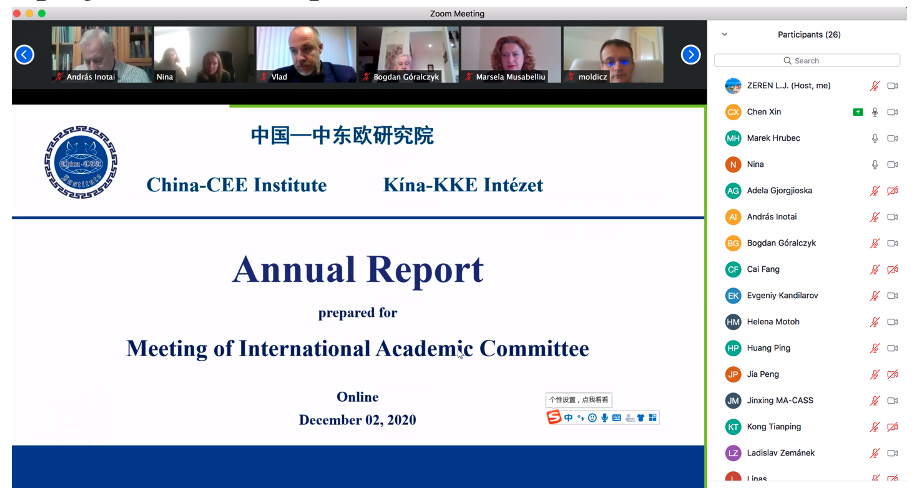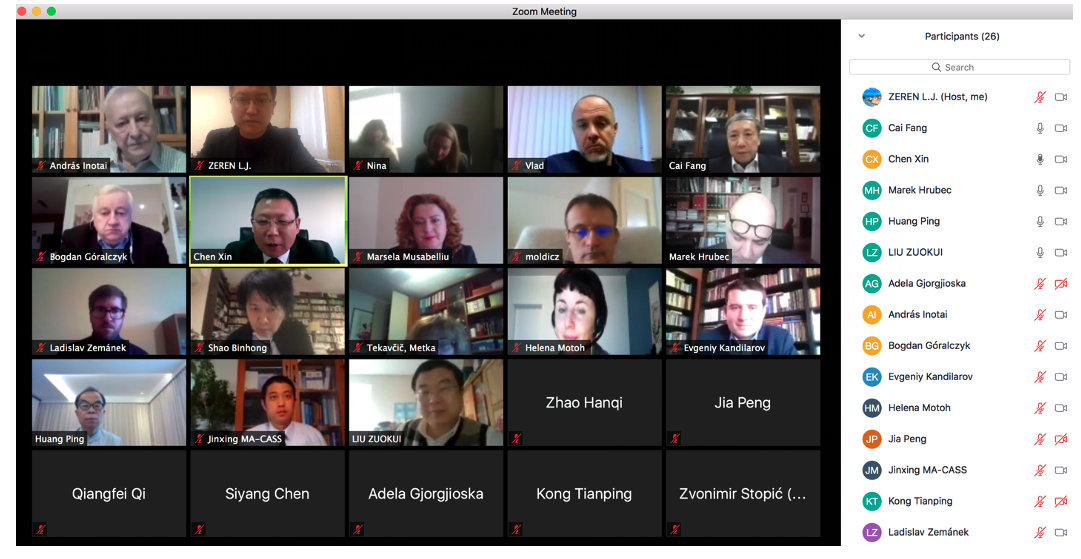Webinar on the 2020 Annual Meeting of International Academic Committee of China-CEE Institute and on the “14th Five-Year Plan and New Opportunities for China-Europe Cooperation”
The China-CEE Institute successfully hosted a webinar on its Annual Meeting of International Academic Committee and on the “14th Five-Year Plan and New Opportunities for China-Europe Cooperation” via Zoom on 2 December 2020. Eight Members of International Academic Committee (IAC) of China-CEE Institute, including Prof. Cai Fang, Vice-President of CASS and Chairman of the IAC, Prof. Huang Ping, former director-general of Institute of European Studies (IES) of CASS, Prof. Chen Xin, Deputy Director-General of the IES and Executive President and Managing Director of China-CEE Institute, Prof. Bogdan Góralczyk, from the Centre for Europe at the University of Warsaw, Professor András Inotai, Senior Research fellow at the Institute of World Economics of Hungarian Academy of Sciences, Professor Metka Tekavčič, Dean of the School of Economics and Business at University of Ljubljana, Prof. Marek Hrubec, Director and Senior Research Fellow at the Centre of Global Studies of Czech Academy of Sciences, and Prof. Kong Tianping, Senior Research Fellow at the IES, attended the meeting. In addition, China-CEE Institute’s non-resident researchers and staff participated the meeting. The webinar was composed of four sessions: (1) keynote speech on China’s the 14th Five-Year Plan (2021-25) for the National Economic and Social Development and the Long-Term Objectives Through the Year 2035, (2) annual report of the Institute for 2020, (3) speeches from IAC members, (4) Q&A session.
Prof. Chen Xin gave the welcome remarks and moderated the first session, during which Prof. Cai Fang gave a keynote speech on China’s 14th Five-Year Plan (2021-2025) for National Economic and Social Development and the Long-Range Objectives Through the Year 2035. Prof. Cai Fang illustrated the highlights of this medium and long-term development plan by focusing on four expressions, namely, the new development stage, new development goal, new development philosophy and new development pattern.

Prof. Liu Zuokui, Vice President of China-CEE Institute, moderated the second session. During this session, Prof. Chen Xin made the annual report of China-CEE Institute. In 2020, China-CEE Institute had many academic activities: firstly, three international roundtable discussions and conferences were co-organized with partner institutes; secondly, 42 working papers were published; thirdly, by 2 December 2020, 637 weekly briefings were published. Weekly briefings achieved full coverage of 16 countries in Central and Eastern Europe and Greece; fourthly, excepting three joint publications with the MNB and Antall Jozsef Knowledge Centre, 14 books were published and another three books will be published soon in December; fifth, two research projects were completed in November 2020.

Following the annual report, six IAC members gave speeches. Prof. Huang Ping talked about the challenges and uncertainties the world is facing for the time being and in the near future, with a special emphasis on the importance of multilateralism in the areas of regional security issues and climate changes. Prof. Bogdan Góralczyk briefly shared very insightful ideas about Trumpian legacy, power shift, ‘new cold war’ and possible solutions to the issues while combing with the European debates on EU budget, the role of German presidency, transatlantic relations and so forth. Professor András Inotai focused on EU-China relations with special attention to both internal and external challenges the EU is facing, to the EU-China cooperation in global issues such as climate changes and global public health issues, and to the possible cooperation in the fields of data privacy protection, technology and how China implements its BRI initiative. Professor Metka Tekavčič introduced the Alliance of Chinese and European Business Schools (ACE), which has twenty universities and colleges as its founding members and under the patronage of the European Foundation for Management Development, and proposed to promote research cooperation with China-CEE Institute to create synergy. Prof. Marek Hrubec’s speech covers six very important issues, including different approaches to the pandemic development, Czech Republic’s response to the pandemic, ‘17+1’ cooperation mechanism and Europe, global interactions, the importance of analysing economic partnership with other countries and regions (apart from China, US and Europe), and China’s five-year plan in combination with global agendas. Prof. Kong Tianping talked about global order and pointed out that the global order is at a crucial stage of transformation. He also stressed on the uncertainty factors, such as the role of Russia, US new administration, transatlantic relations, etc.
After the speeches from the IAC members, China-CEE Institute’s non-resident researchers, including Nina Linde, Marsela Musabelliu, Csaba Moldicz, etc., had further interactions with professors about various issues. By the end of discussions, Prof. Chen Xin gave very comprehensive feedbacks and comments on issues. For instance, regarding the different approaches to the pandemic restriction measures, he mentioned it mainly depends on how to balance between individualism and collectivism, how to respect science and knowledge in a general sense, and how to balance between the importance of people’s life and economic development.

In the end, Prof. Chen Xin introduced new staff of China-CEE Institute to the meeting participants and announced the successful conclusion of the annual meeting of the International Academic Committee and of the discussions on the “14th Five-Year Plan and New Opportunities for China-Europe Cooperation”.
